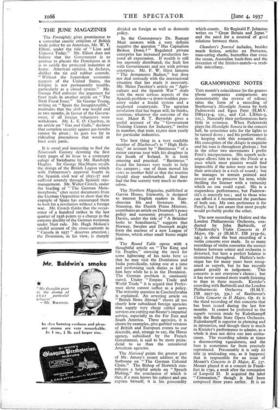THE JUNE MAGAZINES
The Fortnightly gives prominence, to a somewhat caustic criticism of British trade policy by an American, Mr. W. Y. Elliott, under the title of " Lion and Unicorn Today." Mr. Elliott does not believe that the Government is so anxious to placate the Dominions as it is to satisfy the protected industries at home. American opinion, he declares, dislikes the tin and rubber controls. " Without the benevolent economic support of the United States, the Empire is not permanently tenable, particularly as a closed system." Mr. George Peel enforces the argument for freer trade in another article on " The Next Fiscal Issue." Sir George Young, writing on " Spain the Insuppressible," maintains that the civil war would end in two months, in favour of the Govern- ment, if all foreign volunteers were withdrawn. Mr. L. E. 0. Charlton, in an article on " Gas and Gulls," declares that complete security against gas-bombs cannot be given ; he goes too far in ridiculing precautions that would at least avert panic.
It is novel and interesting to find the Nineteenth Century devoting the first forty pages of its issue to a centenary eulogy of Swinburne by Mr. Randolph Hughes. Sir ,George MacMunn recalls the doings of the British Legion which with Palmerston's approval fought in the Spanish civil war of x835-37 and suffered severely through Spanish mis- management. Mr. Walter Crotch, under the heading of " The German Meta- morphosis," cites secret documents from the German Opposition to show that the example of Spain has encouraged them to look for a revolution without a foreign war, Mr. Crotch thinks that the occur- rence of a hundred strikes in the last quarter of 1936 points to a change in the extreme docility of the German workmen under Nazi rule. Mr. Hugh Molson's candid account of the cross-currents in " Canada in 1937 " deserves attention ; the Dominion, in his view, is sharply
divided on foreign as well as domestic policy.
In the Contemporary Dr. Ramsay Muir answers with a very definite negative the question " Has Capitalism Broken Down ? " Regulated private enterprise has increased production be- yond all expectation. If wealth is still too unevenly distributed, the fault lies with Governments and not with private enterprise. Mr. F. W. Hirst laments " The Armaments Budget," but does not deal seriously with the international situation that has made it necessary. Mr. Heinz Paechter's article on " Agri- culture and the Spanish War " deals with the most serious aspects of the Spanish problema down4rodden peas- antry under a feudal system and a neglected countryside. The agrarian revolution that has begun will, he thinks, continue, whatever the outcome of the war. Major B. T. Reynolds gives a useful account of the Government Training Centres for Industry," twelve in number, that train 12,000 men yearly for particular industries.
The best thing in a very readable number of Blackwood's is " High Holi- day," an account by " Bartimeus " of a motor caravan tour with his daughter in the South of Ireland. It is both amusing- and practical. " Bartimeus " found the farmers very ready to help the campers ; one of them moved his cows to another field so that the tourists should sleep undisturbed. And they had the fine scenery very much to them- selves.
The Northern Magazine, published at Garvin House, Isleworth, is designed to interest English readers in Scan- dinavian life and literature. Mr. Staining, the Danish Prime Minister, contributes an article on Denmark's peace policy and economic progress. Lord Davies, under the title of " A Britisher looks to Scandinavia," suggests that Norway, Sweden and Denmark might form the nucleus of a new League of Nations, which other small States might join.
The Round Table opens with a thoughtful article on " The King and his Peoples," stressing the need for some lightening of his tasks here so that he may visit the Dominions and India periodically, taking one at a time and performing such duties as fall to him here while he is in the Dominion. The German problem is cautiously stated. Under. " Empire Trade and World trade " it is argued that Prefer- ence alone cannot suffice as a policy. The minority question in Czechoslovakia is explained. An arresting article on " British News Abroad " shows all too clearly how subsidised foreign agencies that supply very cheap cabled news services are cutting out Reuter's impartial service, especially in the Far East and South America. These agencies, it is shown by examples, give garbled versions of British and European events to our discredit, and, strange to say, the Havas agency, subsidised by the French Government, is said to be more preju- dicial to us than the sensational American agencies.
The National prints the greater part of Mr. Amery's recent address at the Sorbonne on The German Colonial Claim." The Bishop of Norwich con- tributes a helpful article on " Speech Making," the conclusion of which is that, if a man knows his subject and can express himself, it is his- -personality
which counts. Sir Reginald F. Johnston writes on " Great Britain and Japan " and the need for a renewal of good relations between them.
Chambers's Journal includes, besides much fiction, articles on Provence, man-eating sharks, butterflies that cross the ocean, Australian bush-fires and the invention of the friction-match—a read- able miscellany.










































 Previous page
Previous page